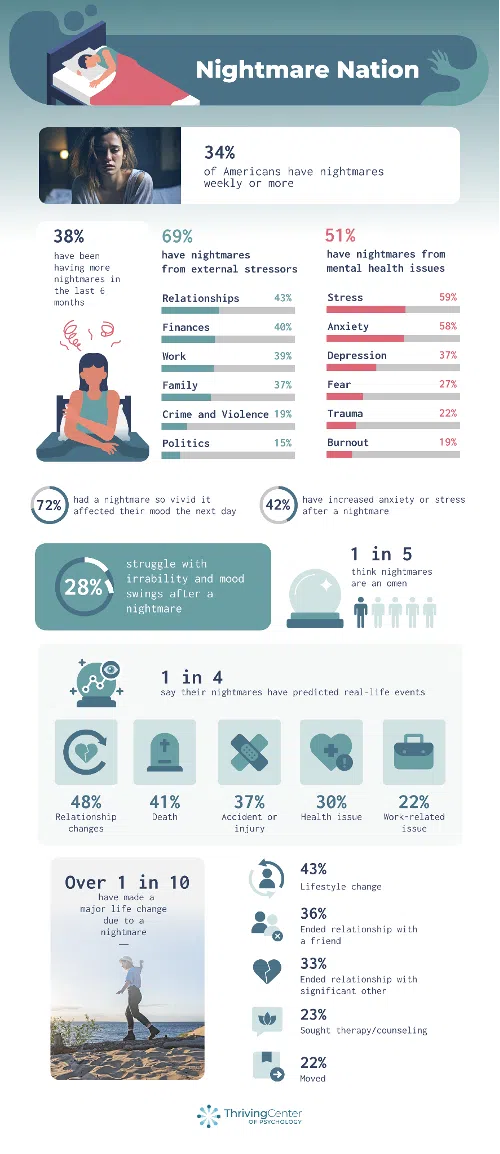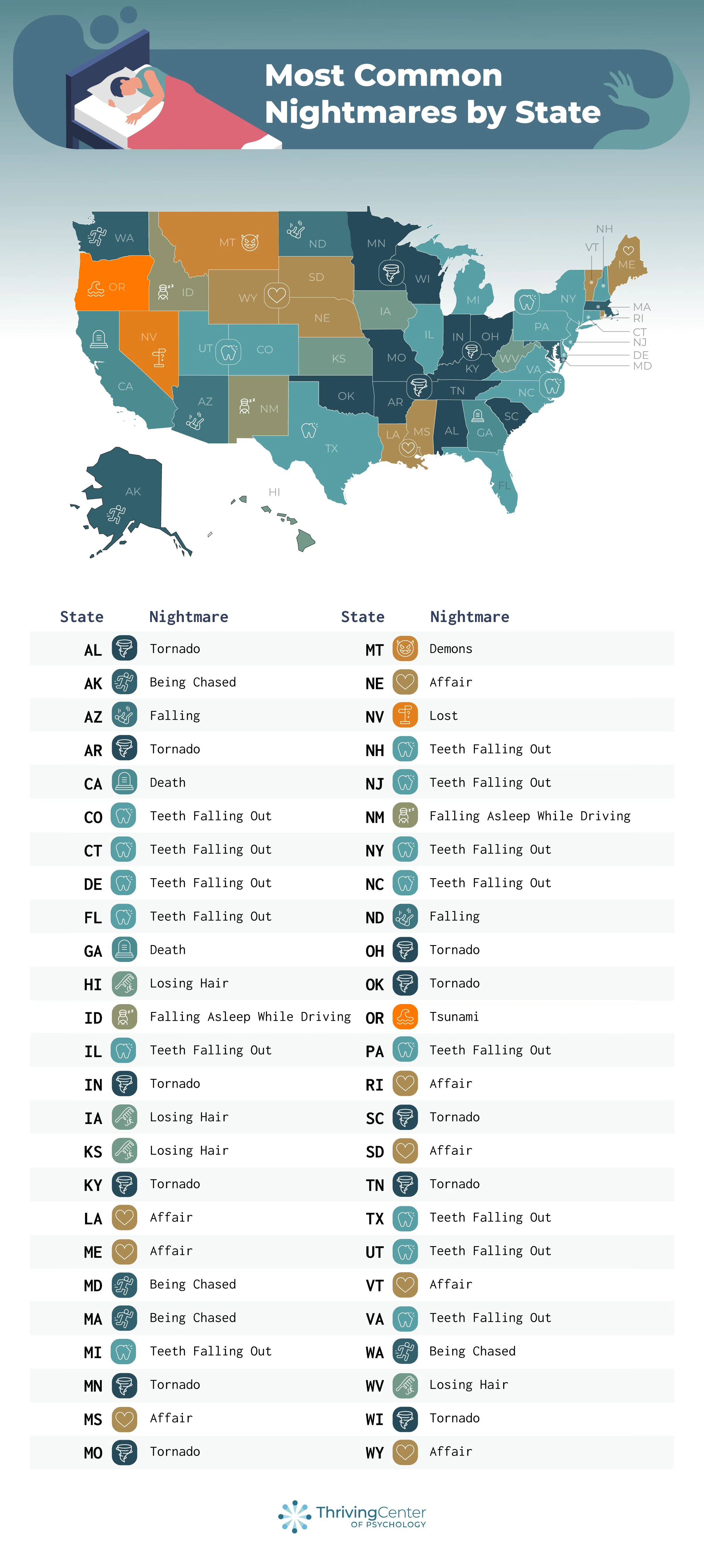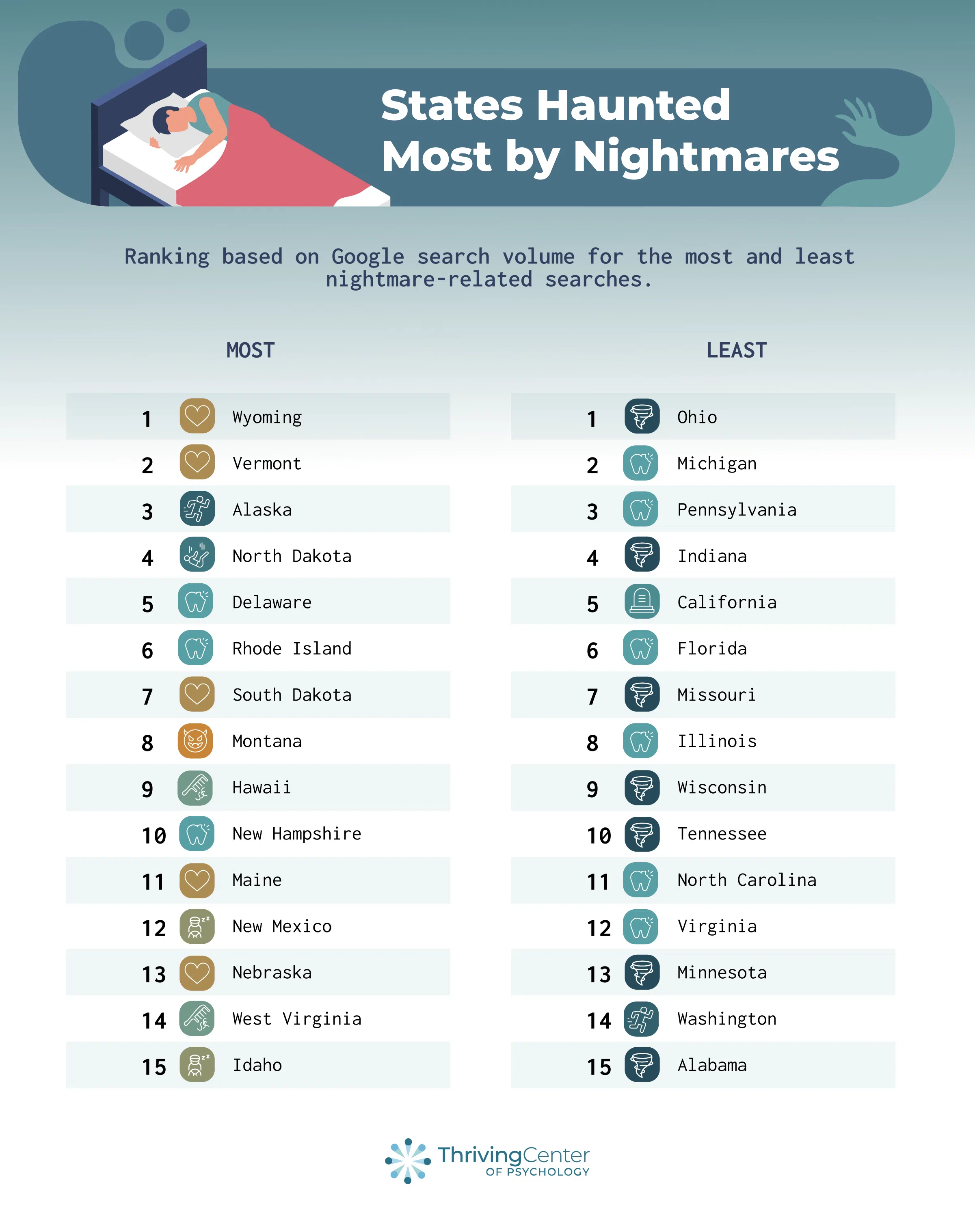All a Bad Dream? 1 in 4 Think Their Nightmares Predicted the Future
Americans have a lot on their minds. From navigating daily stress due to work or mental health to grappling with bigger widespread issues like politics, climate change, or crime, it’s safe to say there’s a lot to think about daily. For many, stressors aren’t only encroaching on their minds during waking hours, but also when they try to sleep in the form of nightmares, or bad dreams.
But what are people seeing once they close their eyes? This new report examines what nightmares are keeping people up at night and how people are responding to them. Some are going so far as to make major life changes because of these frightening dreams.
Survey: 1 in 4 Americans Say Nightmares Predicted Real-Life Events

According to a survey of over 1,000 Americans, 34% are having nightmares weekly or more. Many have been struggling more with these bad dreams recently. During the past six months, nearly 2 in 5 (39%) have been having more nightmares.
69% blame nightmares on external stressors such as:
- Relationships
- Finances
- Work
Meanwhile, 51% believe some of their nightmares are due to mental health issues such as:
- Stress
- Anxiety
- Depression
- Fear
- Trauma
Nightmares can put people in a funk. After having one, 72% say it affected their mood the next day, and 42% report having increased anxiety or stress afterward.
“If the brain processes the nightmare like a lived experience, our minds can have trouble differentiating imagined from reality,” describes Dr. Tirrell De Gannes, a Licensed Clinical Psychologist with Thriving Center of Psychology. “An example of this is dreaming your partner cheats on you though they have not and being upset with that person as a result.”
1 in 5 think nightmares are an omen, and 1 in 4 say their nightmares predicted real-life events.
The most common things people say their nightmares foreshadowed were relationship changes, deaths, and accidents or injuries. One 30-year-old man from New Jersey shared that he dreamed of his dog’s death the day before it happened. Meanwhile, a 53-year-old man from New York said he dreamed of his friend’s unexpected pregnancy.
Over 1 in 10 (11%) made a major life change after their nightmare. Most changed their lifestyle while others say their nightmare led them to end their relationships with a friend or significant other. Nearly 1 in 4 (23%) sought therapy or counseling due to their nightmare.
“Therapy is great for mapping out what caused the nightmare, what to do with those extraneous feelings, and how to mitigate the effect of feeling dysregulated,” explains Dr. De Gannes. “Also, a good therapist can hear you out when you share your nightmare and not make you feel judged or re-triggered by the experience.”
Most Common Nightmares by State

Americans turn to Google after having a nightmare to try and make sense of what happened in their minds. The most common nightmare people search for across all 50 states is dreams about their teeth falling out. That’s the top nightmare in 14 states including New York, Texas, and Illinois.
What does it mean if your teeth fall out in a dream? There are a lot of theories, some believe it symbolizes a loss while others believe it is anxiety-related or health-related.
“Dream interpretations can be done by certain therapists with the appropriate training and background,” says Dr. De Gannes. “However, nightmares cannot be accurately interpreted by using books or random online websites that claim to use “experts”. Nightmares are as personal and unique as the people having them.”
The second most common nightmare is dreams about tornadoes. Unsurprisingly, many states that deal with these dreams are at risk of enduring the natural disaster, such as Oklahoma which is located in an area known as “tornado alley.” Arkansas, Missouri, Alabama, Indiana, Tennessee, and five other states also struggle with tornado-related nightmares.
While Arizona and North Dakota have the most falling nightmares, Idaho and New Mexico worry about a different kind of falling- falling asleep while driving. California and Georgia deal with darker nightmares about death, and for Montana, the most common nightmares there are about demons.
States Most and Least Haunted by Nightmares

Certain states are haunted more by nightmares than others, at least according to their Google search history. The states most haunted by nightmares are Wyoming, Vermont, Alaska, North Dakota, and Delaware.
Apparently, the Midwest doesn’t have as many nightmares. Of the top 15 states least haunted by nightmares, seven are in the Midwest. Ohio and Michigan are the top two least haunted followed by Pennsylvania, Indiana, and California.
While nightmares can happen to everyone, they can be a sign of mental health issues such as PTSD. If you’re consistently having horrible nightmares, reach out to a therapist to talk or a psychiatrist for medication. Everyone deserves a good night’s sleep.
Methodology
In September 2024, we surveyed 1,002 Americans about their dreams and nightmares. Survey respondents ranged in age from 18 to 81 with an average age of 40. 52% were women, 45% men, 2% were non-binary, and 1% would rather not say.
To determine the most common nightmares and states haunted the most and least by nightmares we analyzed 923 Google search volume terms related to nightmares such as “I dreamed all my teeth fell out,” “chasing dream meaning,” and “cheating nightmare.” The total search volume during this period was then calculated per capita and visualized per 100,000.
For media inquiries, please contact [email protected].
Fair Use
When using this data and research, please attribute by linking to this study and citing thrivingcenterofpsych.com

Anxiety Attack and Panic Attack Differences
’s easy to mix up anxiety and panic attacks. While anxiety attacks and panic attacks do have overlapping symptoms, they are different. Let’s get into the differences between anxiety and panic attacks so you can be in a better position to get the help you need.

How to Overcome Procrastination and Anxiety
Procrastination is a very typical human experience. At some point or another, we’re all guilty of putting off that task we know is important. Maybe it’s household chores, filling your taxes, paying bills, or some other mind-numbingly boring task.

How to Build a Consistent Routine That Combats Depression
Depression can feel like a pit you can’t escape from, but know that depression is treatable with the right help. A basic daily ritual encourages healthy habits like a regular sleep schedule, healthy food choices, and exercise that support mental health.

How to Manage Stressful Life Transitions and Events
From getting into college or having a baby to splitting from a spouse or experiencing the death of a loved one, life can surprise you with big wins and tear you down with loss. Life is filled with transitions, some happy, others stressful and difficult.
